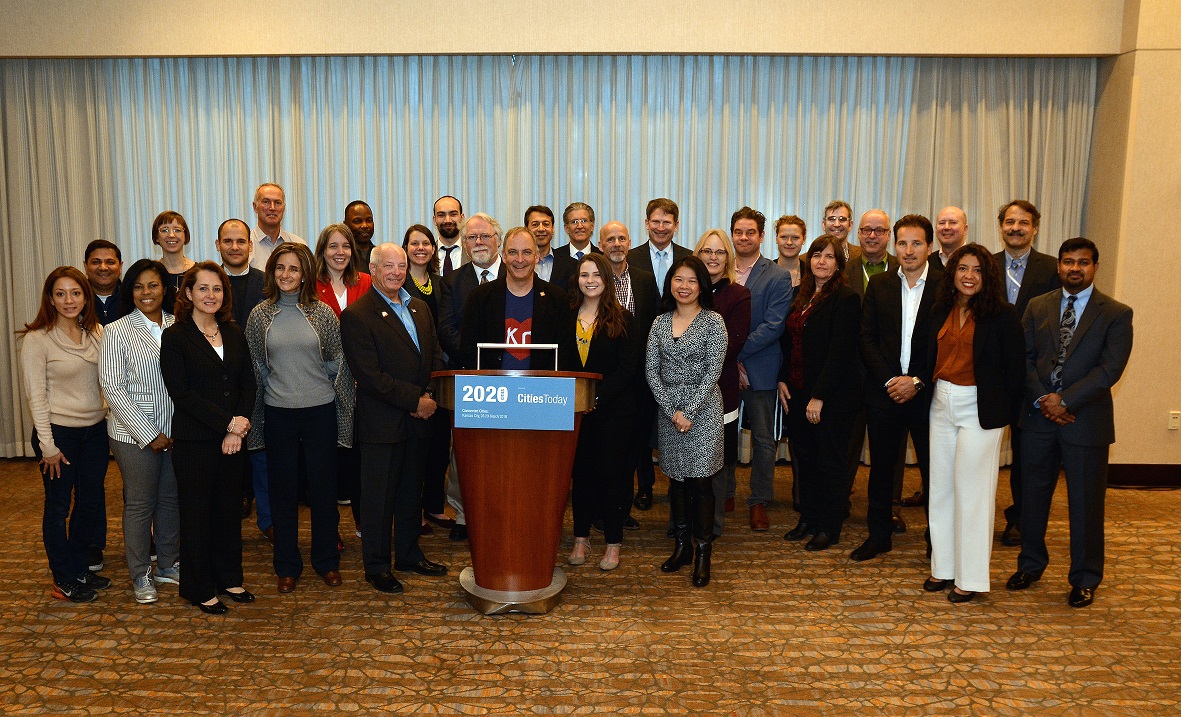
Photo: 2020-Kansas-City-group-photo
Five takeaways from 2020 Cities, Kansas City
09 April 2018
by Jack Aldane
Cities Today organised its first North American meeting for 2020 Cities hosted by Bob Bennett, Chief Innovation Officer, Kansas City, Missouri on 28-29 March.
2020 Cities is a global network of CIOs, CTOs, deputy mayors and directors focused on addressing challenges and developing solutions in partnership with start-ups and corporates. The ninth meeting, chaired by Miguel Gamiño, brought together 22 cities from across North America to advance the solutions agenda through roundtable discussions with Chris White, CEO Americas, Philips Lighting; Hugh Martin, Vice-President IoT Platforms & SCV Strategy, Verizon; and Maddie Callis, Manager of City Possible Mastercard.
1. Focused, small-scale meetings give Chief Information Officers (CIOs) greater reassurance of working with the private sector
The meeting began on one salient observation offered by a guest CIO: the private sector would sooner steal ideas from its competitors than share any of those ideas with anyone else. CIOs at the meeting said they felt “a lot more comfortable facing vendors” and were able to demonstrate how emerging phenomena such as the Internet of Things (IoT) can impact specific cities across the US.
“Pitching for the sake of a pitch is one thing, but seeing exactly how it is relevant to a specific city is much more equitable and can help drive a CIO’s initiative forward,” said Kimberly LaGrue, CIO, New Orleans.
2. Chief Information Officers require access to dialogue that reflects the complexity of their role
One of the main action points to emerge from the talks was the role of the CIO. CIOs are “stewards of technology”, according to one participant speaking in summation of the meetings. Yet, compared with many heads of department in local government, they take a multifarious perspective on the problems faced by their city. Their concerns are not just about appropriating the right kinds of technology, but about the business models that are best able to harness these products in service of each and every citizen. Technology is therefore a comparatively small piece of the puzzle. By gaining exposure to actors who bridge product and process, CIOs at the centre of this nexus have more chance of formulating actionable plans that address real problems.
3. Nation states could be a thing of the past. Working together at closer quarters is where change is most likely to happen
Mayors around the world showed defiance when Donald Trump announced he would withdraw the US from the Paris climate agreement in 2017. Yet none were as defiant as urban leaders on the US home front. Whether setting a course against the grain of international relations or actively leading nations towards a better future, cities are evolving with a momentum difficult to contain or match by the state. This is encouraging CIOs to bring their urban visions to life.
“We each came here and were able to work together without any hassle,” concluded Dabbert Doornbosch, Deputy CIO, The Hague, the Netherlands.
4. Leave no city behind
Participants also debated the digital divide that benefits big cities but not small. “Vendors don’t often think about how their products scale down,” Michael Mayta, CIO, Wichita, commented. Citizens in small towns are just as willing as those in large metropolises to be on the right side of the digital revolution. The vendor’s mission however often only takes the latter into consideration.
“Smaller cities don’t necessarily want to follow. It’s good to remind the private sector that smaller cities need their innovation just as much as the large metro cities,” Mayta added.
5. The next generation will vote for tech-literate leaders
Speakers agreed that changes in the way people relate to technology are happening more fervently in cities. When a new generation replaces the old, the role of technology in civic life will gain its full appreciation.
“Mayors and city leaders of the future will be of a generation that expects more of technology and has a growing appreciation of digital citizenship,” said Miguel Gamiño, Chairman, 2020 Cities.
Some attendees said they could remember a time, around 15 years ago, when cities felt isolated in their attempts to implement new technology. Now, their ambitions are connected to the needs of firms, customers and citizens. Today’s initiatives rely upon CIOs for their success. Without them, they die.








